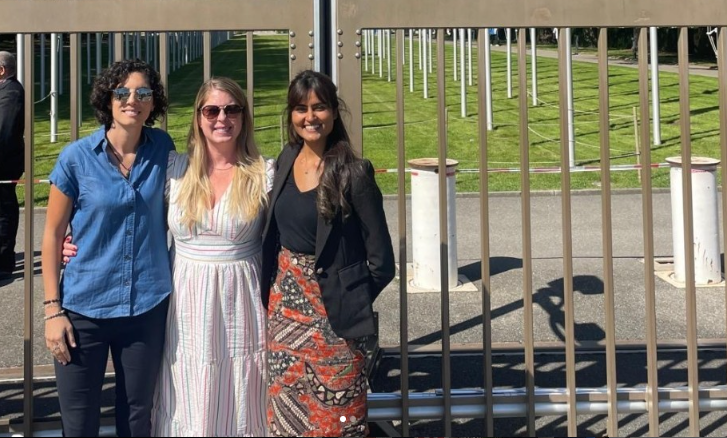The UN Refugee Agency (UNHCR)’s Global Consultations with Non-Governmental Organizations (NGOs) have been convened for 30 years as a space to exchange ideas, identify policy priorities, and inform collaboration between UNHCR and NGOs. Asylum Access, a regular attendee, participated in this important forum from June 11-13, 2024, in Geneva, represented by Deepa Nambiar, Director of Partnerships, and Interim Co-CEOs Rouba Anka and Lisa D’Annunzio. This year’s event centered on Solutions, Inclusion, and Gender Equality.
The consultations are an invaluable platform for NGOs and Refugee-Led Organizations (RLOs) to present their expertise, engage in open debates, and foster collaborative efforts to address pressing challenges. However, we also believe it is crucial to address recurring issues and areas that need urgent attention to ensure genuine inclusion and representation of proximate actors, especially RLOs.
The consultations provided a unique opportunity for informal networking, and enabled connections among RLOs, NGOs, International NGOs, and UNHCR partners worldwide. These interactions strengthened our existing relationships and allowed us to explore new ones. We are grateful for the opportunity to attend different panels and activities, and appreciate this year’s inclusion of interactive sessions, which marked a refreshing change from the traditional panel style. These sessions fostered deeper engagement and collaboration among participants. The closing ceremony, beautifully presented with the closing speech by the CEO of the Lotus Flower, Taban Shoresh, highlighted the power and potential of forcibly displaced voices in shaping their futures.
However, despite the focus on Inclusion and Gender Equality, the participation of forcibly displaced individuals with diverse backgrounds remained limited. Specialized panels on the topic related to LGBTQI+ refugees or disability issues, for example, also lacked attendance, indicating perhaps an overall lack of engagement or interest on these critical issues.
Moreover, the absence of refugees and other local partners as speakers in key panels was also stark. The opening panel featured the heads of UNHCR and the International Council of Voluntary Agencies (ICVA) but lacked representation from individuals with lived experience. Similarly, the panel on Partnerships included only UNHCR and international networks. This oversight is a missed opportunity to feature more representative voices in line with the theme of the Consultations, requiring deeper reflection on whose voices are prioritized in these critical discussions.
Finally, while we noticed an increase in refugee participation and leadership at this event, systematic barriers are still limiting their participation, exacerbated by external factors such as the event’s location. Holding the Consultations in countries requiring visas without providing sufficient support for refugees to attend is a significant issue. Many refugee leaders and RLOs, including our partners, were denied visas, despite extensive lobbying efforts following similar issues at the Global Refugee Forum (GRF) last year.
As part of our ongoing efforts to promote refugee participation and leadership, we would like to enhance this ongoing conversation with some of our thoughts and recommendations:
1. Prioritize removing barriers to participation: In line with UNHCR’s commitments to refugee leadership and localization, it is crucial to ensure visa access for refugee leaders, and provide sufficient time for attendees to secure visas. Other RLOs, including the Resourcing Refugee Leadership Initiative (RRLI) have also called for a change in location of these events away from Switzerland to another country with more friendly visa policies. We cannot afford to lose the participation and engagement of forcibly displaced leaders at these important spaces. Addressing the systemic barriers for representation to these global events is essential.
2. Ensure Greater Diversity in Panel Selection: Panels should be co-designed with RLOs and community members to reflect topics most relevant to their needs, and feature diverse speakers closest to the issue being discussed. We should move away from the default of including UNHCR and INGO speakers for panels, and move towards a new default where refugees and those working closest with them are featured in every panel. The R-Space organized during the previous GRF exemplifies the possible dynamism when RLOs lead the design of sessions and refugees are at the center of the discussions. Incorporating such learnings can enhance the relevance and impact of future consultations.
3. Increase Interactive Sessions: Building more interactive sessions recognizes the rich expertise present among all attendees, not just the selected panelists. This approach fosters greater engagement and collaborative problem-solving.
We acknowledge that these conversations are necessary, and we are confident that UNHCR is committed to ensuring genuine refugee inclusion and localization. We hope our contributions will enrich this conversation, and we reiterate our commitment to supporting refugee leadership and participation, equitable partnerships, and shifting power to ensure greater dignity and agency so that forcibly displaced people can thrive.

